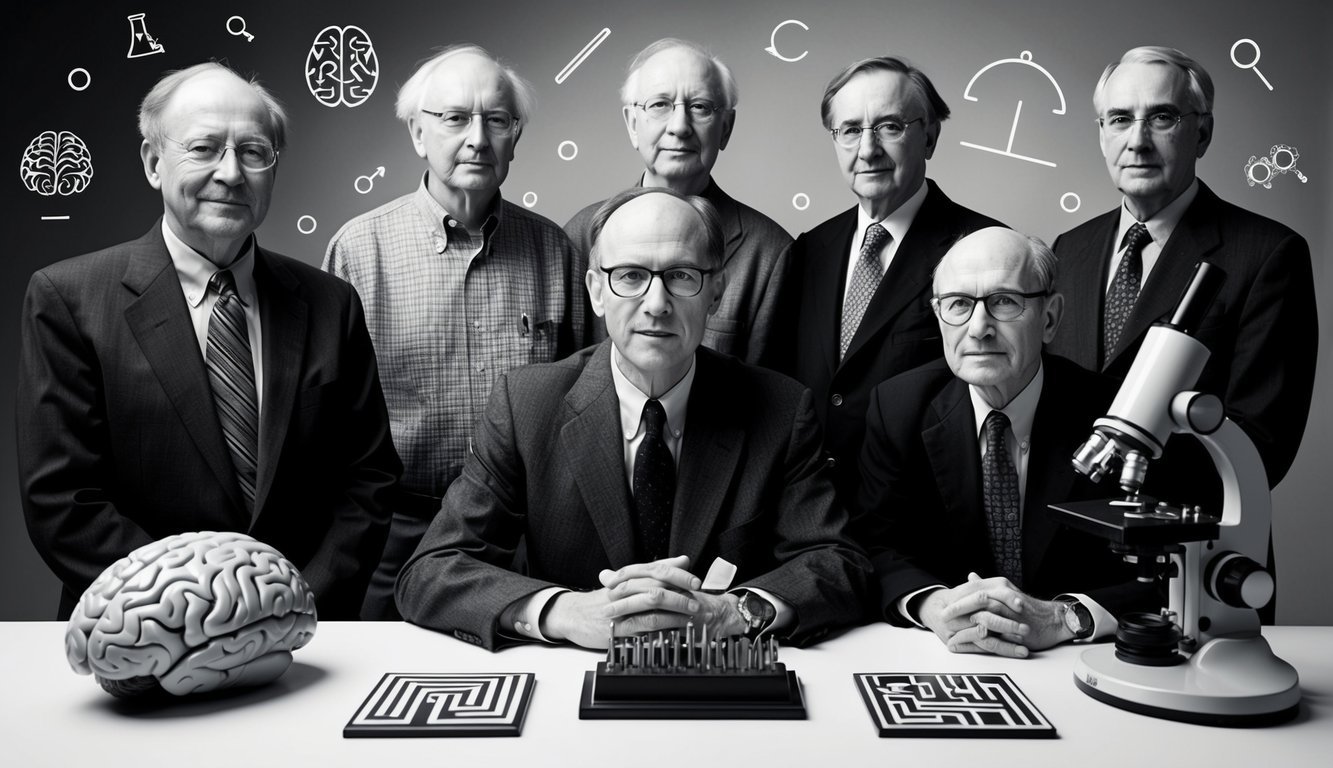PsychNewsDaily Publishers
100 Summit Drive
Burlington, MA, 01803
Telephone: (320) 349-2484
PsychNewsDaily Publishers
100 Summit Drive
Burlington, MA, 01803
Telephone: (320) 349-2484
Psychology encompasses various theoretical frameworks, including structuralism, functionalism, behaviorism, and cognitive psychology, shaping our understanding of mental processes and human behavior.

The discipline of psychology is underpinned by a variety of theoretical frameworks and schools of thought that have shaped our comprehension of human actions and mental activities. These foundational concepts are essential for contemporary research and practice within the field.
Psychology became a distinct academic field in the late 19th century, with Wilhelm Wundt founding the first psychological laboratory in 1879, which signified the advent of experimental psychology. This development initiated systematic scientific exploration of mental functions.
Early contributors like William James and Edward Titchener offered differing perspectives on consciousness—James centered on the purposes of mental activities, while Titchener concentrated on their structured components. These differing views set the stage for future theoretical advancements.
The American Psychological Association was established in 1892, serving as a collaborative and standardizing body within the field. Its ongoing contributions are vital in shaping current psychological research and practice.
Structuralism, initiated by Titchener, sought to dissect mental processes into their most fundamental elements, whereas functionalism, advocated by James, highlighted the adaptive functions of these processes.
Sigmund Freud’s psychoanalytic theory investigated the unconscious mind’s role in influencing behavior, significantly impacting both clinical psychology and broader cultural norms.
Behaviorism, represented by John Watson and B.F. Skinner, redirected attention toward observable behavior and external factors. This approach prevailed in psychology throughout much of the 20th century.
Cognitive psychology surfaced in the 1950s, concentrating on mental processes such as perception, memory, and problem-solving, and it continues to be significant in various subfields, including developmental and educational psychology.

Within psychology, various theories elucidate human behavior, development, and mental processes. These frameworks facilitate an understanding of how individuals learn, develop, and shape their personalities.
Jean Piaget’s cognitive development theory details the evolution of children’s thinking through distinct stages. Erik Erikson’s psychosocial development theory delineates eight life stages, each presenting unique challenges and growth opportunities.
Lev Vygotsky’s sociocultural theory highlights the significance of social interaction in cognitive development, introducing the concept of the zone of proximal development, which emphasizes the role of guidance in learning.
Lawrence Kohlberg’s moral development theory outlines the progression individuals make through stages of moral reasoning, building on Piaget’s foundational work while exploring ethical decision-making.
Ivan Pavlov’s discovery of classical conditioning illustrates how associations between stimuli can lead to conditioned responses. Conversely, B.F. Skinner’s operant conditioning theory illuminates the reinforcement and punishment of behaviors.
Albert Bandura’s social learning theory merges elements of behaviorism and cognitive psychology, stressing observational learning and the notion of self-efficacy.
Information processing theory compares human cognition to computer processing, focusing on how information is perceived, stored, and retrieved by individuals.
Sigmund Freud’s psychoanalytic theory posits that unconscious impulses and past experiences influence personality. In contrast, Carl Jung’s analytical psychology expanded Freud’s concepts, introducing archetypes and the collective unconscious.
Abraham Maslow’s hierarchy of needs outlines a spectrum of human motivation, ranging from basic physiological needs to the pursuit of self-actualization. Meanwhile, Carl Rogers’ humanistic perspective emphasizes the importance of personal growth and self-concept.
The Big Five personality theory identifies five essential traits: openness, conscientiousness, extraversion, agreeableness, and neuroticism, and is widely employed in personality research and evaluation.

The evolution of psychology has been profoundly influenced by numerous individuals whose significant contributions have shaped our understanding of human behavior and mental processes.
Wilhelm Wundt’s establishment of the first psychology laboratory in 1879 represents the emergence of psychology as an experimental science. William James, often referred to as the “Father of American Psychology,” authored the landmark book “Principles of Psychology.”
Sigmund Freud, who pioneered psychoanalysis, emphasized the role of the unconscious mind in behavior. His contemporaries, Alfred Adler and Carl Jung, also significantly advanced psychodynamic theory.
B.F. Skinner rose to prominence in behaviorism, examining how the environment shapes behavior. Additionally, Jean Piaget’s investigation into children’s cognitive development fundamentally transformed the field of educational psychology.
Albert Bandura’s social learning theory created a bridge between behaviorism and cognitive perspectives, with his work on self-efficacy being influential across multiple domains.
Aaron Beck and Albert Ellis developed cognitive therapy, which stands as a key component of contemporary psychotherapy, significantly aiding in the treatment of depression and anxiety disorders.
Daniel Kahneman’s research on decision-making within behavioral economics earned him a Nobel Prize, impacting fields beyond psychology, including finance and public policy.
Noam Chomsky’s theories regarding language acquisition have profoundly shaped psycholinguistics and cognitive science, continuing to influence our understanding of human communication and cognition.

Psychologists utilize a variety of methodologies to investigate human behavior and mental functions, employing techniques that range from experimental designs to observational studies and psychological assessments.
Experimental psychology serves as the core of psychological research, wherein researchers manipulate variables in controlled environments to explore cause-and-effect relationships. The inception of scientific inquiry into psychology began with Wilhelm Wundt’s laboratory in 1879.
The introspection method involved trained individuals articulating their conscious experiences—a controversial yet significant contribution to understanding subjective perceptions.
Studies on observational learning, exemplified by Albert Bandura’s Bobo doll experiment, reveal how behavior acquisition occurs through observing others, underscoring social influences on behavior.
Pragmatism in psychology accentuates practical implications and real-world applications of theories, which has influenced contemporary research methodologies.
Psychologists employ a variety of assessment tools to measure mental states, cognitive abilities, and personality characteristics, yielding quantifiable data for evaluation and interpretation.
Projective tests, such as the Rorschach inkblot test, aim to access unconscious thoughts and feelings, providing unique insights into personality dynamics, despite being controversial.
Behavioral assessments monitor individuals in naturalistic or controlled contexts, while token economies—a behavioral modification method—reward desirable behaviors with tangible incentives.
Neuropsychological evaluations assess cognitive abilities and assist in diagnosing brain-related disorders, often involving tasks that measure memory, attention, and problem-solving skills.
Self-report measures, including surveys and interviews, collect subjective data directly from participants, though they can be susceptible to biases in responses.
Psychological principles are applied across various sectors, enhancing mental health, educational practices, and workplace dynamics, showcasing the real-world relevance of psychological research and theories.
Client-centered therapy, created by Carl Rogers, underscores the importance of empathy and unconditional positive regard, fostering a supportive atmosphere for clients to explore their emotions and experiences.
Cognitive therapy, developed by Aaron Beck, addresses harmful thought patterns, enabling clients to recognize and challenge negative cognition, thus fostering healthier thought processes.
Talk therapy encompasses various techniques like psychoanalysis and behavioral therapy aimed at addressing a wide range of mental health conditions including anxiety and depression.
Mental health practitioners employ evidence-based strategies to customize treatments to the distinct needs of individuals, often integrating multiple therapeutic approaches into personalized care plans.
Educational psychology leverages psychological principles to enhance learning results, with researchers examining cognitive growth, motivation, and learning styles to ameliorate teaching practices.
Educators utilize psychological principles to design effective lesson plans and classroom management tactics, implementing methods such as positive reinforcement and scaffolding to nurture student learning.
School psychologists are essential in diagnosing and treating learning disabilities, collaborating with students, parents, and educators to develop tailored educational plans.
Furthermore, educational psychologists contribute to curriculum development, assessment procedures, and educational policy, informing best practices in teaching and learning.
Organizational psychologists implement psychological principles within workplace environments, seeking to enhance employee satisfaction, productivity, and overall organizational efficacy.
They formulate strategies aimed at effective leadership and team dynamics, providing training programs to boost communication and conflict resolution skills.
These professionals also assist in the selection and evaluation of employees, designing and applying tools such as personality assessments and job performance metrics.
Research from organizational psychology frequently informs stress management initiatives and employee wellness programs, fostering healthier, more effective work environments.
Psychology collaborates with multiple disciplines, enriching our understanding of human behavior and cognitive functions. These interdisciplinary relationships enhance research methods and theoretical frameworks, leading to deeper insights into the human psyche.
The melding of psychology with neuroscience has transformed our insights into cognitive functioning. This evolving field, known as cognitive neuroscience, investigates how neural processes influence mental operations.
Researchers leverage advanced imaging techniques to analyze cognitive functions such as perception, attention, and memory, allowing them to observe brain activity as it correlates with specific tasks.
The exploration of consciousness has greatly profited from this collaboration, as neuroscientists and psychologists jointly investigate the neural correlates of conscious experiences, enhancing our understanding of both conscious and unconscious aspects of the mind.
Language processing is another intersecting domain, where psychology and neuroscience converge to examine the brain regions involved in speech production and comprehension, yielding insights into language acquisition and disorders.
The overlap between psychology and sociology delves into the effects of social contexts on individual behavior and cognition. Known as social psychology, this field connects personal and societal perspectives.
Social learning theory exemplifies this intersection, explicating how behavior is learned through observation within social contexts.
Researchers in this field analyze group behavior, prejudice, and attitude formation, probing how social factors mold individual perceptions and decision-making.
Diversity is a key focus in this interdisciplinary collaboration, where psychologists and sociologists aim to understand the impact of cultural backgrounds on cognitive and social interactions.
Studying problem-solving dynamics in social settings is also crucial, as scholars assess how individuals and groups confront challenges influenced by their social environments.
“`